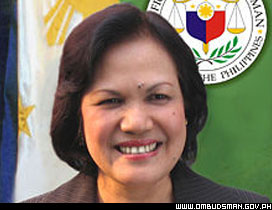By ELLEN TORDESILLAS
 THE government paid a price for getting Merceditas Gutierrez to resign as Ombudsman, a deal one official justified by saying that subjecting her to a drawn-out impeachment trial would have been an emotional and divisive political exercise.
THE government paid a price for getting Merceditas Gutierrez to resign as Ombudsman, a deal one official justified by saying that subjecting her to a drawn-out impeachment trial would have been an emotional and divisive political exercise.
A highly reliable source said President Benigno Aquino III agreed to the two conditions Gutierrez set in exchange for her resignation. One, she would get her full retirement benefits. Two, government would not file charges against her.
The deal, however, does not preclude private individuals from filing cases against the former Ombudsman, who had also served as acting justice secretary during the Arroyo administration, the source said.
Presidential Spokesperson Edwin Lacierda denied that any deal was forged with Gutierrez. “There was no deal,” he said.
Lacierda added that Gutierrez might have “seen the writing on the wall, as evidenced by the overwhelming votes in the House of Representatives to impeach her.”
Appointed Ombudsman in December 2005, Gutierrez’s term of office was supposed to end in December 2012. Her resignation took effect on May 6.
The Judicial and Bar Council is expected to finalize Monday the shortlist of candidates to replace Gutierrez. Among the 26 nominated are recently retired Supreme Court Associate Justice Conchita Carpio-Morales and lawyers Jose Manuel Diokno and Ernesto Francisco.
Ironically, it was another deal that led, first to calls for Gutierrez’s impeachment, and then her resignation. As Ombudsman, she approved a plea bargain agreement in which former Armed Forces of the Philippines comptroller Carlos Garcia surrendered some of his unexplained assets in exchange for the dismissal of plunder charges against him.
On March 22, the House of Representatives approved—by a vote of 210 to 47, with four abstentions—House Resolution 1089 calling for Gutierrez’s impeachment. Seven cases were submitted as bases for the charge of betrayal of public trust. These include her failure to act on the P728 million fertilizer fund scam and to file appropriate cases against ranking Philippine National Police officials caught in Moscow carrying large sums of euros not declared with the Philippine Bureau of Customs.
The resolution also accused Gutierrez of violating her constitutional mandate when she absolved officials of the Commission on Election in the anomalous Mega Pacific deal, former First Gentleman Jose Miguel Arroyo in the suit over the $328 million national broadband project with the Chinese firm ZTE, and Philippine Navy officials implicated in the death of Ensign Philip Pestaño. Had she not resigned, the impeachment trial at the Senate would have started May 9, 2011.
Crusading anti-graft lawyer and former solicitor general Frank Chavez, who had declined the nomination for Ombudsman, said the agreement Gutierrez struck with the Aquino administration in exchange for her resignation “doesn’t sit well in the order of things.”
Even if Malacañang’s commitment doesn’t prevent him and other individuals from filing cases against Gutierrez, it is still “prejudgment” and “wraps her with a mantle of immunity, ” he said.
Chavez asked, “What if someone files a case against her for betrayal of public trust or violations of the penal code and she is convicted?”
A conviction, he said, would carry the punishment of a ban from holding public office and forfeiture of her retirement benefits.
“This smacks of a backroom kitchen recipe,” the former solicitor general said.
The source who revealed the deal to VERA Files said immediately after the House of Representatives voted for to impeach her, Gutierrez called an Aquino government official asking for advice. “Ano ba ang gagawin ko (What am I going to do)?” she said.
The source said the Aquino government official had dealt with Gutierrez a number of times during the nine-year Arroyo administration.
The source said the official advised her to resign. “Wala kang panalo diyan (You are not going to win).”
The source said there was no immediate reaction from Gutierrez. A few weeks later, at a reception, the official met a banker who is a close friend of Gutierrez. The banker agreed to arrange a meeting between Gutierrez and the official, which took place in a condominium unit in Ortigas a few days later.
In the meeting, the official appealed to Gutierrez’s sense of patriotism by sparing the country the trauma that an impeachment trial would create on the public. “He (the official) sensed that Gutierrez was torn,” the source said, adding that there were those close to former President Gloria Arroyo telling Gutierrez she had a chance of being acquitted at the Senate.
The source said Gutierrez did not make any commitment in that meeting but mentioned the two conditions, which were relayed to Malacañang.
In the morning of April 29, Gutierrez met with President Aquino in Malacañang and tendered her resignation, effective May 6.
In her resignation statement, Gutierrez acknowledged that the President deserved an Ombudsman who had his complete trust and confidence.
“To carry on my battle to cleanse my name before the Senate would detract from the time which could otherwise be devoted to legislative work which would address the needs of millions of Filipino people,” she said.
She expressed the hope that with her resignation, “we can now all focus on the impelling problems of our people rather than expending so much time, effort and resources to remove me from public office.”
The source said Gutierrez was assured the government would not initiate any suit against her. “Hindi gagalaw (It won’t move).”
After his meeting with Gutierrez, Aquino issued a four-paragraph statement announcing her resignation, thanking the House of Representatives and instructing the JBC to start the search for a new Ombudsman.
“Her action has spared the country from a long and divisive impeachment process that would have distracted our lawmakers from dealing with the many problems we face today,” Aquino said.
He added that with a new Ombudsman, “we can now proceed more decisively in making government officials more accountable to their bosses, the Filipino people.”
Sen. Francis Escudero, member of the JBC in his capacity as chair of the Senate Committee on Justice and Human Rights, said the President has until Aug. 4, 90 days after the vacancy occurred, to choose the new Ombudsman.
